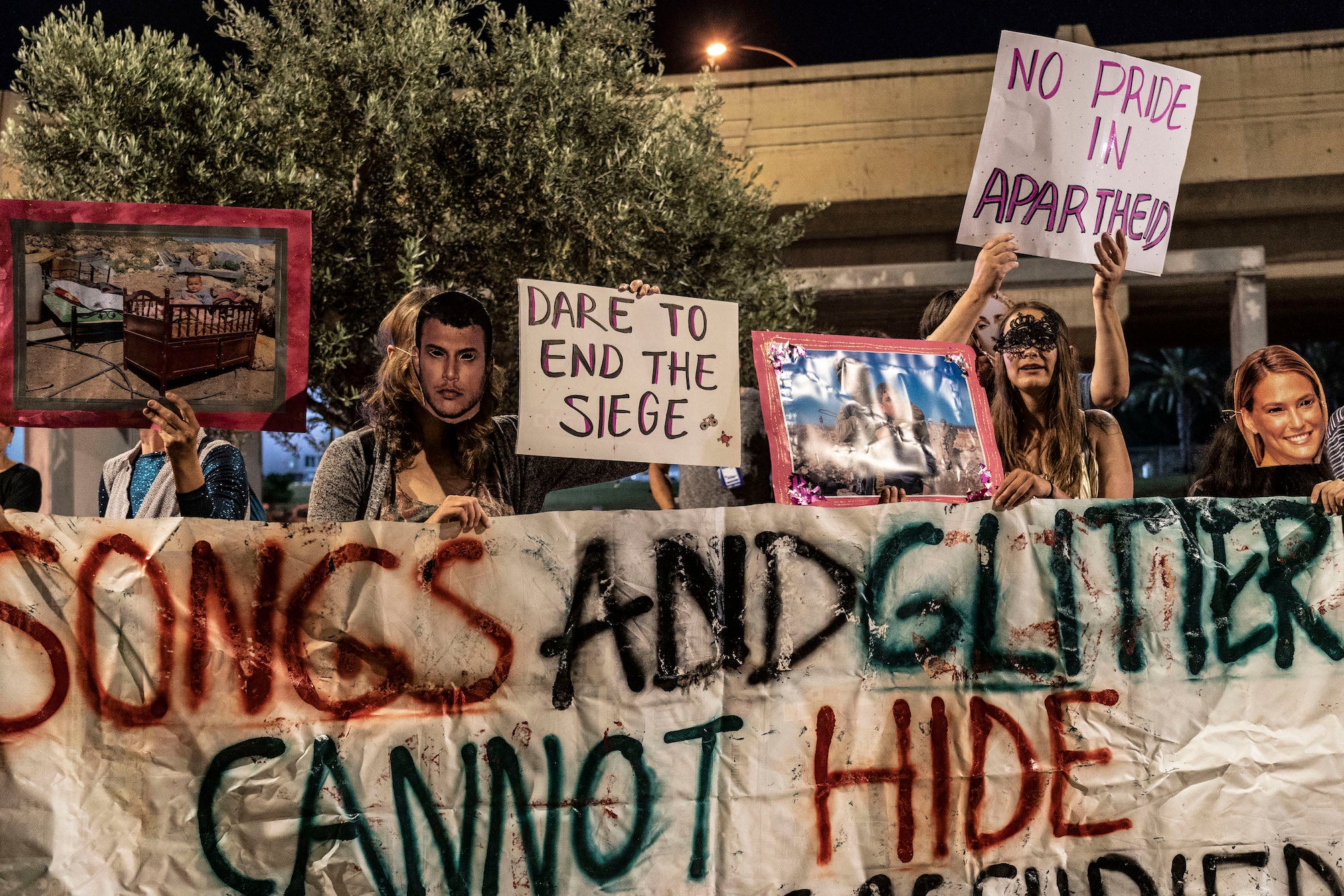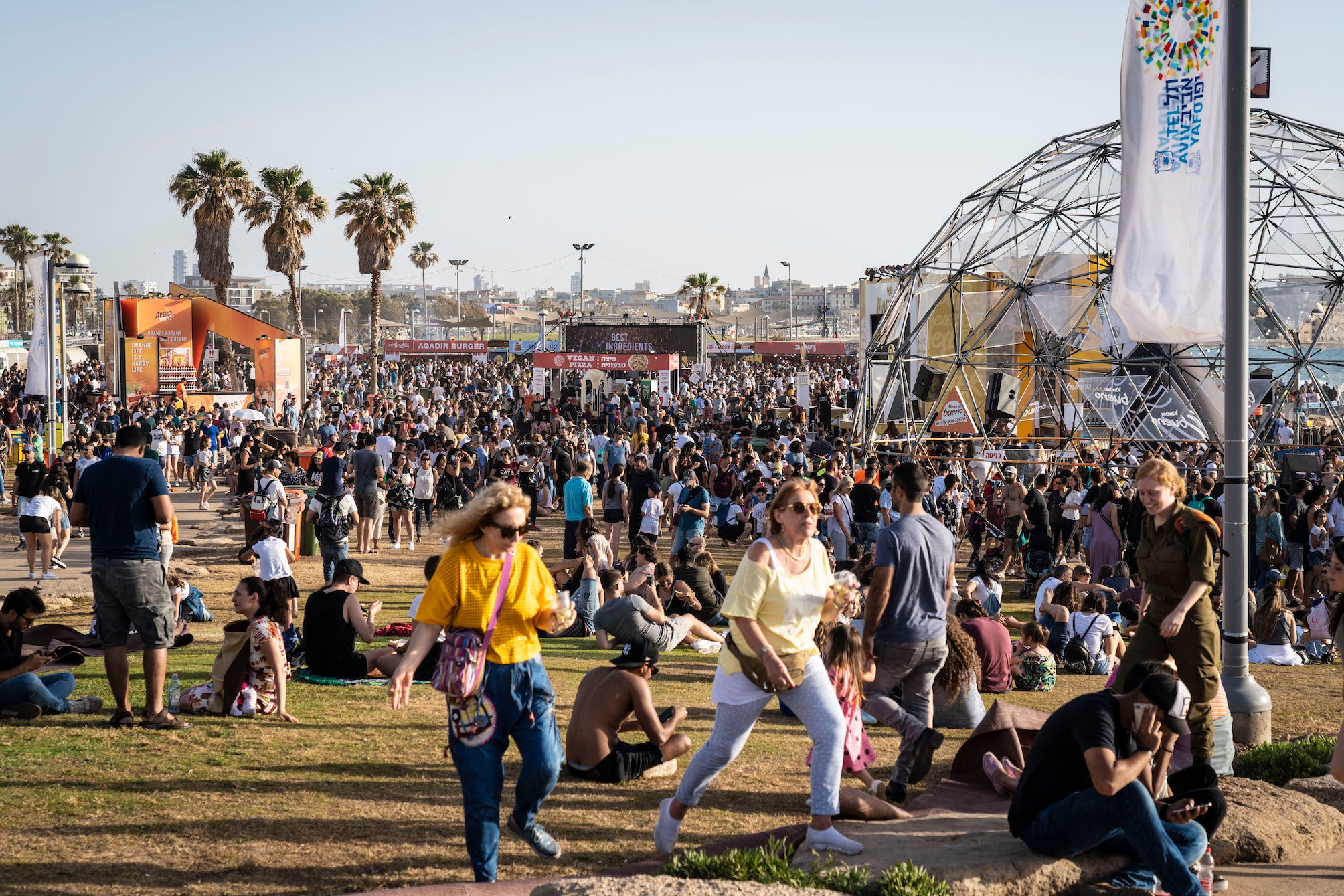Eurovision: Protests and parties take over Tel Aviv against backdrop of political tensions
Thousands gathered in Tel Aviv for the 64th song contest, but many said the show "art washed" violence and occupation
Your support helps us to tell the story
From reproductive rights to climate change to Big Tech, The Independent is on the ground when the story is developing. Whether it's investigating the financials of Elon Musk's pro-Trump PAC or producing our latest documentary, 'The A Word', which shines a light on the American women fighting for reproductive rights, we know how important it is to parse out the facts from the messaging.
At such a critical moment in US history, we need reporters on the ground. Your donation allows us to keep sending journalists to speak to both sides of the story.
The Independent is trusted by Americans across the entire political spectrum. And unlike many other quality news outlets, we choose not to lock Americans out of our reporting and analysis with paywalls. We believe quality journalism should be available to everyone, paid for by those who can afford it.
Your support makes all the difference.It was a day of parties but also protests in Israel as the Eurovision final kicked off in Tel Aviv, in arguably one of the most fraught years for the international competition.
At the Eurovision village, fans from across Europe and Israel spent the day along the seafront celebrating in the sprawling 15-acre park packed with gourmet food stands, bars and tributes to Israel’s 2018 winner Netta Barzilai.
Five miles north at the Expo centre, where the acts performed, small protests gathered outside the main hall chanting at those with tickets as they filed in wearing glittery outfits and flags.
In Jerusalem, clashes broke out between the security forces and Ultraorthodox Jews who were protesting against the desecration of the Sabbath because the final was scheduled for Saturday.
Meanwhile across the West Bank and Haifa, a city in Israel with a large Arab population, Palestinians held “Globalvision”, a protest alternative to Eurovision, where they showcased Palestinian singers in an attempt to draw attention to the Israeli occupation of their territory. They lived streamed the acts via Facebook.
Even Madonna, who headlined the grand finale, came under fire from pro-Palestinian groups - largely because her Ray of Light foundation, a social justice program, supports a number of Palestinian projects, including funding teachers’ salaries at UN schools across Gaza.
On Saturday morning, Primal Scream frontman Bobby Gillespie went as far as calling the famed singer a “total prostitute” for performing at Eurovision, saying her choice helps to “normalise the state of Israel” which sits on “stolen land”.
This year’s competition, the 64th song contest, has been labelled the most politically fraught yet in Eurovision’s long history, a competition that has had its fair share of controversy.
Just seven years ago, there were calls for a boycott of Eurovision when it was held in Azerbaijan, over concerns for the country’s terrible rights record and its crackdown on regime critics. The authorities also forcibly evicted people to make way for the Baku Crystal Hall arena where the contest was held, sparking uproar.
Enjoy unlimited access to 100 million ad-free songs and podcasts with Amazon Music
Sign up now for a 4 month free trial (3 months for non-Prime members)
Enjoy unlimited access to 100 million ad-free songs and podcasts with Amazon Music
Sign up now for a 4 month free trial (3 months for non-Prime members)
In 2017, Ukraine, the host nation, banned the Russian entrant Yulia Samoilova from entering the country saying she had made an unauthorised visit to Crimea a year after it was annexed by Russia.
But this year the focus has been the Israeli-Palestinian conflict which nearly toppled into a war just 10 days before the contest began, when militants in Gaza fired 700 rockets at Israel, who responded by striking 350 targets in the besieged strip.
Tensions have soared as over the last year nearly 300 Palestinians in Gaza have been killed by Israeli fire during weekly protests against an Israeli-imposed siege which has led the United Nations to accuse Israeli soldiers of committing possible war crimes.
The Israelis vehemently deny the charge saying they are defending their civilians. They extensively deployed its Iron Dome aerial defence system in advance of the contest in case of any flare ups of fighting.
Outside the Expo centre in Tel Aviv on Saturday night, as jubilant crowds gathered to celebrate a small rally organised by “No Pride in Apartheid” an Israeli rights group, protested against the show saying it “art washed” the Israeli occupation of Palestine.
“Songs and glitter cannot hide homeland being occupied” the crowd chanted at people filing into the centre, while wearing masks of Netta’s face as they held up pictures of violence in Gaza and the occupied West Bank. It sparked a tense stand off with some Israelis who shouted back “you are all liars”. One particularly angry Eurovision fan gave them the middle finger.
Omer, 26, an Israeli activist told The Independent the point of the protest was “to expose the truth and fight the idea that Israel is a normal democratic country”. He said it was an important point to make at a time when the far right in Israel was gaining a lot of support.
“There are daily violations of human rights, there are people under military occupation but they are trying to pinkwash and art wash the truth with Eurovision, to use this image of Tel Aviv as an LGBT friendly space while people are killed in Gaza,” he said.
“They forget there is an occupation, that is part of the daily reality of Palestinians that they have to pass through checkpoints, that they don’t have passports that they are refugees, they are prisoners of the Israeli state,” he added.
His points were echoed by Iceland’s controversial steampunk band Hatari who stirred controversy earlier in the week when they said they chose to participate in Eurovision to expose the “face of the occupation”.
However, these protests have not stopped any of the 41 acts from performing or tens of thousands of foreign visitors flocking to the events held across Tel Aviv.
At the Eurovision village, fans said that the contest should be embraced for bringing people together and not politicised.
“It’s such nonsense to mix policies with Eurovision. It is wrong,” said Paulo, 40, from Madrid, who together with a friend was attending his third Eurovision.
“Rules are rules, Israel won last year and so have every right to host it this year.”
Reginald, 40, from the Netherlands, added: “It is a freaking song competition, leave the politics behind and enjoy a rare moment where everyone lives their differences and comes together.”

Israelis who were joining in the festivities said boycotting Eurovision was boycotting “an entire nation” and was not fair.
“You can’t boycott an entire people on the basis of what you read in a newspaper. A lot of what people know about Israel is lies. When I hear a singer won’t perform in Israel, the only democracy in the Middle East, to me that only encourages division. You cannot deny that Israel exists,” said Naor, 26, an engineer.
“Eurovision has helped the world see that we are open to everyone, we are incredibly proud,” she added.
Her friend Efrat, 28, a student and member of the LGBT+ community said for him it was an important moment to cement Tel Aviv’s position as a gay-friendly city.
“As a gay man this means a lot,” he added.

In Jerusalem rallies by the Ultraorthadox were focused on the holding of the final on Saturday, which they said was a desecration of the Sabbath. Footage shot in Jerusalem saw the Haredim in scuffles with the security forces.
”This matter is shocking and deeply hurtful and completely contradicts the principles of our existence as a Jewish state,” key rabbis said in a statement carried by Israeli outlet Israel National News.
“Since its establishment, the State of Israel has taken upon itself to preserve the sanctity of the Sabbath and the Jewish character in its public space. We cannot accept a situation in which the most elementary values of our people are trampled on all sides,” the statement added.
Back in Tel Aviv the jubilant parties continued late into the night, with The Netherlands Duncan Laurence as the bookies favourite to win the glass microphone trophy, sitting at 3/4 according to Oddschecker on Saturday.
“The show has gone on – and in such a spectacular way, despite all that has happened against Eurovision and against Israel,” said Avi, 21, partying in a nearby bar. “That says a lot.”

Join our commenting forum
Join thought-provoking conversations, follow other Independent readers and see their replies
Comments